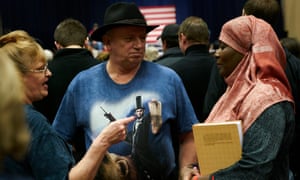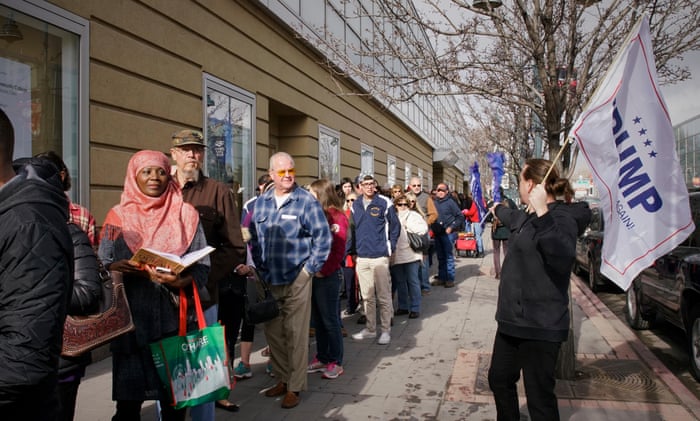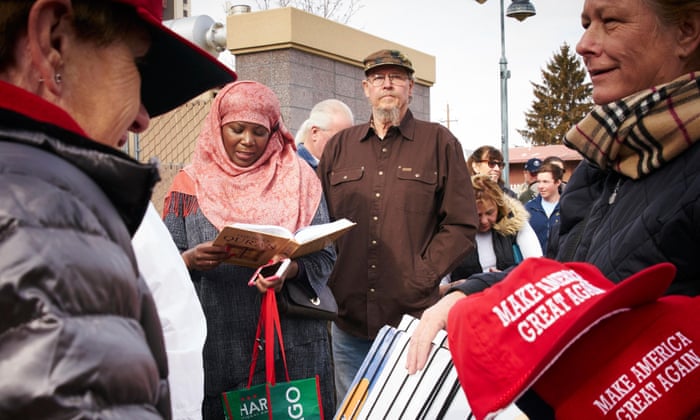

The author discusses political philosophy with two people in attendance at a Trump rally. (The gentleman’s T-shirt is widely available.) Photograph: Will Whipple for the Guardian
After Rose Hamid’s horrifying experience at Trump’s rally on Friday in South Carolina, many people might wonder how I survived a Trump rally wearing a bright-orange headscarf while holding a giant Qur’an – or why I went at all.
Trump rallies: where supporters get their pumped-up kicks from his bellicosity
Read more
I went because I firmly believe that Hamid was on the right path: it is important for people to stand up peacefully for the right things, even if we are confronted with physical and verbal intimidation. It is important to give people that may not have ever met or interacted with a Muslim an opportunity to meet her and learn about Islam from someone that actually practices it. And it is important, at a time when people like me too often face discrimination and hatred living our daily lives, to be polite, and yet be visible and present when we are the subject of political speeches.
And nothing bad happened to me at the rally: there were some hard stares and dirty looks, but no outright rude behavior. I spoke to several lovely people and had the type of informative and substantive discourse that one should expect at a political event. It was good to see that the bullies and thugs who have been fixtures at several other Trump rallies had taken the day off; maybe they were just too shocked to say anything directly to me.
Before this weekend, I’d never staged any sort of civil disobedience act; before this weekend, I had been perfectly content to never attend a Trump rally. But Hamid inspired me to make myself visible to the kind of people the media suggests hate me, and to make myself available for their edification.
So I looked up Trump’s speaking schedule, discovered that he was speaking on Sunday in Reno, Nevada (a four-hour drive from me), downloaded a ticket and hopped into my car.
I drove overnight through a blizzard and fog, but I arrived safely and I was able to get to the venue about 15 minutes after the doors opened; already, the line snaked around the building. Many people in line did double-takes, or their heads snapped around to gawk at me (almost to the point where I thought they would snap off), but I was permitted to stand in line and wait as about a half dozen vendors peddled a motley array of Trump merchandise around us.
The most provocative act that I encountered occurred towards the beginning of my two-hour wait: a vendor noticed me and immediately came down to my section of the line where he loudly announced that he was selling “Bomb The Hell Out Of Isis” T-shirts (apparently, the desire to kill people is considered trendy fashion at a Trump rally). He looked directly at me to see how I would react; I looked back at him, shook my head, smiled and read my Qur’an as I patiently waited for someone to engage me in civil conversation.
To Trump and his supporters, Asian countries have “dumped” their goods in America and almost bankrupted our country by causing our trade deficit; Mexico won’t keep “illegals” (who are the “source” for Americans’ drugs) on their side of the border; and, of course, Muslims have “always” been fighting us, and come from countries populated by ingrates who are unwilling to pay for the wars that we started on “their” behalf.
But solving our trade deficit isn’t as simple as ending the supply of cheap Asian goods that Americans so happily consume. Mexico is not going to pay us to build us a wall. The rest of the world will not stand by and let the US seize Iraq’s oilfields (and thus control a significant supply of the world’s oil).
Trump’s supporters, though, love him for his outrageous suggestions; it provides them with a sense of empowerment and control. And his lack of specificity allows each person to hear what they want to hear.
The increasing popularity of these types of events reflects the fact that Trump supporters – the people who used to be Tea Partiers, who supported Michele Bachmann or Sarah Palin or any one of a number of politicians who’ve used this rhetoric before Trump – aren’t going to go away. Whether Trump wins or loses, his supporters will still be out there, longing for another leader to “make America great again”.
People like me cannot keep thinking and hoping that Trump supporters will all go away eventually. We cannot continue to believe that they represent a fringe group of people and that their candidates can never be elected to a major role in government. We need to see them, and listen to them, and disagree respectfully. We need to, as Americans, begin talking to and not at one another.
I understood that I was a guest at their rally, and that I had a duty to them to be a good guest; in return, I felt like they were good hosts. And whether they engaged me directly or not, many of them had to acknowledge the presence of someone who disagreed with them, but who did not fit their stereotypes by being disagreeable.
Yes, what I did could have been dangerous: the Trump campaign, like many movements, has been dogged by its share of mischief makers. The thugs and bullies who have hurt other dissenters are a small, but very real, part of the ultra-nationalism that vague, implausible rhetoric like Trump’s attracts.
But it was worth the risk to me to show them that their insecurities about Muslims were unfounded. It was worth it to humanize Muslims for them. And it was worth it, to me, to recognize their humanity, too.

No comments:
Post a Comment